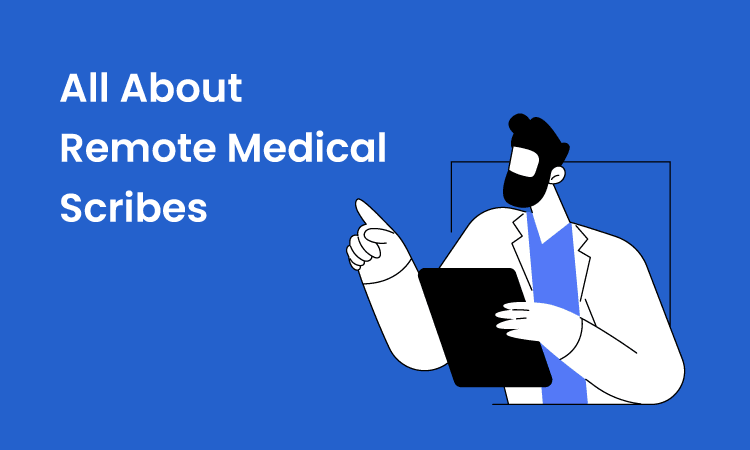In recent years, healthcare has been rapidly adapting to various technological advancements. One such development is the emergence of medical professionals working online. A remote medical scribe, for example, documents patient encounters for physicians. They provide valuable assistance to physicians, allowing the latter to focus on patient care rather than paperwork.
A leading provider of remote medical scribe services is Wing. Wing’s services offer a unique approach to medical scribing by combining advanced technology with highly skilled scribes. However, to ensure that these services are successful, it’s important for healthcare practices to work with the right software developer.
In this article, we will delve into the world of remote medical scribes, as well as the importance of hiring the right software developer to ensure a successful implementation for your business.
What is a Remote Medical Scribe?
A remote medical scribe is a professional who assists healthcare providers by documenting patient encounters and managing other administrative tasks remotely. Unlike traditional medical scribes who work alongside healthcare providers in-person, remote medical scribes work from a remote location, typically offsite.
They work in real-time, listening to the healthcare provider’s conversation with the patient through a secure, HIPAA-compliant audio channel, and entering the relevant information into the patient’s electronic health record (EHR) system.
Remote medical scribes are becoming increasingly important in healthcare facilities due to their ability to improve the quality of patient care while reducing administrative tasks. They allow healthcare providers to focus on the patient and provide better care by handling administrative tasks, such as updating EHRs and transcribing medical notes, in real time.

Job Description of a Remote Medical Scribe
Understanding the role and responsibilities of a remote medical scribe is essential for healthcare facilities looking to implement this service.
In this next section, we’ll dive into the specific responsibilities of a remote medical scribe. We will also look at the required skills, qualifications, training, and certification options available for those interested in this career.
Responsibilities of a Remote Medical Scribe
A remote medical scribe might have different responsibilities depending on the needs of the healthcare facility. However, the primary duty of a remote medical scribe is to keep a record of patient encounters and handle their digital charts. Scribes take down notes, record lab results, and update the patient’s medical history as the provider interacts with the patient.
Another crucial responsibility of a remote medical scribe is to ensure the accuracy and completeness of the patient’s medical records. They must be familiar with medical terminology and understand the intricacies of the medical specialties they are serving. Understanding EHR systems and the privacy laws and regulations associated with handling confidential patient information are also important.
Required Skills and Qualifications

To do their job well, a remote medical scribe needs both technical and soft skills. They must be able to work with electronic health systems, have excellent typing skills and be able to transcribe quickly and accurately.
Additionally, they must be able to communicate effectively with healthcare providers and patients, manage their time, and keep their workflow organized. Knowing how to prioritize tasks, attention to detail, and flexibility are also desirable skills.
In terms of qualifications, most healthcare facilities require that remote medical scribes have at least a high school diploma or equivalent.
Some facilities may require a post-secondary certificate or degree in medical assisting, healthcare administration, or a related field. Additionally, healthcare facilities may prefer candidates with experience working in a healthcare setting, especially with EHRs.
Overall, a remote medical scribe plays a vital role in a healthcare facility. Their skillset and qualifications are essential to their ability to perform their job effectively. Candidates who possess the required skills and qualifications can make a significant impact on healthcare providers’ ability to deliver high-quality patient care.
Training and Certification Options

Training and certification options are available for individuals interested in pursuing a career as a remote medical scribe.
While a formal degree is not required, many healthcare facilities prefer individuals with a background in healthcare, including medical assisting, nursing, or health information management. Some employers may also require candidates to complete an accredited training program or certification course before they can be considered for the role.
Some certification options for medical scribes include the Certified Medical Scribe Professional (CMSP) certification offered by the American College of Medical Scribe Specialists (ACMSS) and the American College of Medical Scribes (ACMS) Certification
These certifications are designed to test a candidate’s knowledge of medical terminology, EHR management, and medical documentation. Obtaining certification can demonstrate to potential employers that a candidate has the necessary skills and knowledge to perform the duties of a remote medical scribe effectively.
Additionally, some healthcare facilities may offer on-the-job training or mentorship programs for new remote medical scribes. These programs can provide valuable hands-on experience and help individuals gain a better understanding of the job duties and responsibilities of a remote medical scribe.
As the healthcare industry continues to evolve, ongoing education and training are essential for remote medical scribes to stay up-to-date with new medical procedures, technologies, and regulations.
Should You Hire a Remote Medical Scribe?
Deciding whether to onboard a remote medical scribe can be a difficult decision for healthcare facilities. Before making the decision to hire, it is essential to consider the pros and cons.
Understanding the benefits and potential drawbacks of hiring a remote medical scribe can help healthcare providers make an informed decision that best suits their practice’s needs. In the next section, we will discuss the advantages and disadvantages of hiring a remote medical scribe.
Pros of Hiring a Remote Medical Scribe
Hiring a remote medical scribe has many potential benefits for healthcare providers. In the following paragraph, we will explore the advantages of hiring a remote medical scribe in more detail, including the cost-effectiveness compared to hiring an on-site scribe, the flexibility and convenience it provides, the access to a wider pool of qualified candidates, and the potential to improve patient satisfaction.
Cost-Effective Compared to Hiring an On-Site Scribe
Hiring a remote medical scribe can be a cost-effective option for healthcare facilities compared to hiring an on-site professional.
Remote medical scribes work from their own location, which eliminates the need for a physical workspace, equipment, and other resources required for on-site scribes. Additionally, healthcare facilities can save money on employee benefits and other expenses associated with having an on-site employee.
By hiring a remote medical scribe, healthcare providers can allocate their resources more effectively and redirect the savings toward other areas of the facility.
Provides Flexibility and Convenience
Another advantage of hiring a remote medical scribe is the flexibility and convenience it provides for both the scribe and the healthcare provider.
Remote medical scribes can work from anywhere with an internet connection, which means they are not limited by geography. Remote scribes can also work on a flexible schedule, which can be especially useful for practices with fluctuating patient volumes. Healthcare providers can adjust the number of hours the scribe works based on their needs, which can help reduce costs while still ensuring high-quality documentation.
In addition, remote medical scribes do not need to be physically present in the healthcare facility, which can help reduce the risk of exposure to infectious diseases for both the scribe and other staff members.
Access to a Wider Pool of Qualified Candidates
Because remote scribes can work from anywhere with an internet connection, healthcare providers are not limited to hiring locally. This can be especially beneficial for practices in rural or underpopulated areas, where it may be difficult to find qualified candidates.
In addition, remote scribes often have specialized training and experience in medical terminology and documentation, which can be difficult to find in a traditional scribe.
By hiring a remote medical scribe, healthcare providers can tap into a larger pool of qualified candidates and find the best fit for their needs, which can ultimately lead to improved patient care and satisfaction.
Improved Patient Satisfaction
With a remote scribe handling documentation, healthcare providers can focus more on interacting with patients and providing quality care. This can lead to improved patient communication and relationships, which can ultimately lead to higher patient satisfaction scores.
By improving the documentation process and allowing healthcare providers to focus on patient care, hiring a remote medical scribe can lead to improved patient satisfaction and outcomes.
Cons of Hiring a Remote Medical Scribe
While hiring a remote medical scribe can offer many benefits, there are also some potential drawbacks to consider. It’s important for healthcare providers to weigh both the pros and cons before deciding whether to hire a remote medical scribe.
So, in the following sections, we will explore these potential drawbacks in more detail and offer suggestions for how healthcare providers can address them.
Potential Security and Privacy Risks
One of the main concerns with hiring a remote medical scribe is the potential security and privacy risks associated with remote access to patient information. Remote scribes may be working from home or another location outside of the healthcare facility, which can make it more difficult to ensure the security of patient data.
It’s important for healthcare providers to have a secure system in place for remote access, such as using encrypted connections and requiring two-factor authentication. In addition, remote scribes should be trained in HIPAA regulations and the importance of patient privacy.
By taking appropriate security measures and ensuring that remote scribes are properly trained, healthcare providers can minimize the risk of data breaches and ensure that patient information remains secure.
Limited Physical Presence
Another potential drawback of hiring a remote medical scribe is the limited physical presence of the scribe within the healthcare facility.
When working remotely, scribes may miss out on important conversations or interactions that take place in person, which can impact their ability to accurately document patient information.
To mitigate this challenge, healthcare providers can consider setting up regular check-ins or virtual meetings with remote scribes to ensure that they are up-to-date on any changes or updates that may impact their documentation.
Additionally, healthcare providers may want to consider using a hybrid model that combines remote and on-site scribes to ensure that there is always someone physically present to assist with patient care and documentation.
Communication and Coordination Challenges
One of the biggest challenges of hiring a remote medical scribe is the potential for communication and coordination issues between the scribe and other healthcare professionals involved in patient care.
When working remotely, scribes may have limited access to other members of the healthcare team, which can lead to miscommunication or delays in patient care.
To overcome this challenge, healthcare providers can set up regular communication channels between remote scribes and other healthcare professionals, such as virtual meetings or secure messaging platforms.
It’s also important to ensure that remote scribes are properly trained in effective communication skills, including active listening and asking clarifying questions. By addressing these communication and coordination challenges, healthcare providers can ensure that remote scribes are an effective and valuable part of the patient care team.
Technical Issues and Other Logistical Problems
Finally, another potential drawback of hiring a remote medical scribe is the possibility of technical issues and other logistical problems.
Working remotely requires a reliable internet connection, which can sometimes be a challenge in certain locations or during periods of high traffic. Additionally, there may be other logistical issues to consider, such as time zone differences or scheduling conflicts.
To mitigate these challenges, healthcare providers can take steps to ensure that remote scribes have access to reliable technology and support, such as providing access to a virtual private network (VPN) or offering technical support services.
Practices must also have contingency plans in place in case of technical issues, such as accessing backup scribes or using alternative documentation methods.
By addressing these potential technical and logistical challenges, healthcare providers can ensure that remote scribes are able to work effectively and efficiently, regardless of their location.
Where to Find Remote Medical Scribes
Now that we’ve covered the pros and cons of hiring a remote medical scribe, you might be wondering where to find qualified candidates for the job. Fortunately, there are several options available to healthcare providers who are looking to hire a remote medical scribe.
One option is to use online job boards and professional networks to post job listings and connect with potential candidates. Another option is to work with staffing agencies that specialize in healthcare staffing, which can provide access to a larger pool of qualified candidates and offer additional support services.
Finally, some training and certification programs offer job placement services for graduates, which can be a good option for healthcare providers who are looking for candidates with specific skills or qualifications.
Let’s explore each of these options in more detail.
Online Job Boards and Professional Networks
Online job boards and professional networks are popular options for healthcare providers who are looking to hire a remote medical scribe.
These platforms allow providers to post job listings and connect with potential candidates from around the world. Some popular job boards and networks for healthcare professionals include Indeed, LinkedIn, and ZipRecruiter.
Providers can also use industry-specific job boards and networks, such as the American Health Information Management Association (AHIMA) job board, to target candidates with specific skills or qualifications.
Staffing Agencies that Specialize in Healthcare Staffing
Staffing agencies that specialize in healthcare staffing can be a valuable resource for providers looking to hire a remote scribe.
These agencies typically have a pool of pre-screened and qualified candidates, which can save providers time and resources in the hiring process.
Additionally, staffing agencies can handle the administrative tasks associated with hiring, such as payroll and benefits, which can further streamline the hiring process.
Training and Certification Programs that Offer Job Placement Services
Training and certification programs that offer job placement services can also be a great option for providers looking to hire a remote medical scribe.
These programs provide individuals with the necessary skills and knowledge to become remote medical scribes and often offer job placement services upon completion of the program.
By hiring individuals who have completed a reputable training and certification program, providers can ensure that their remote medical scribe has the necessary skills and knowledge to perform their duties effectively.
Hire HIPAA-compliant Remote Medical Scribes from Wing
Before hiring a remote medical scribe, healthcare facility managers, doctors, and other healthcare providers should carefully consider the pros and cons and determine if it is the right fit for their organization.
With proper training, communication, and technology, remote medical scribes can provide valuable assistance to healthcare providers, allowing them to focus on providing the best possible care to their patients.
If you are looking for HIPAA-compliant scribes, Wing provides a comprehensive solution to healthcare facilities. It is important to select a reputable and reliable provider, like Wing, to ensure that the remote medical scribes are properly trained and equipped to handle the job. Get in touch today to learn more!
Alexander Lim is the founder and CEO of Cudy Technologies, a platform aiming to deliver high-quality educational content to students around the world. He is also a freelance writer specializing in tech, startups and marketing. He’s passionate about learning, digital marketing, and the SaaS space, and he likes writing about how startups can market their products and content effectively online.






